|
|
|
Sort Order |
|
|
|
Items / Page
|
|
|
|
|
|
|
| Srl | Item |
| 1 |
ID:
161506
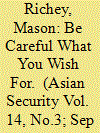

|
|
|
|
|
| Summary/Abstract |
There is a lacuna in the literature analyzing the mid-term (6-24 months) period after a DPRK contingency that results in the Pyongyang regime’s relatively sudden and unmanaged fall. This article helps fill that gap, particularly with respect to security issues that would challenge Korean unification efforts during such a period. Following an Introduction, Section I first makes the case for a DPRK contingency being the most plausible end to the Pyongyang regime. Assuming the scenarios from Section I, Section II addresses the question of what critical issues a unifying Korea will face over the mid-term, and how dealing with these challenges will condition the type of end-state that a unified Korea will embody. In particular we examine three challenges: (a) mid-term security provision related to potential weapons proliferation, cyber-security, organized criminality, and human security; (b) the foundations of institution-building through measures dealing with issues of transitional justice, disputed land title claims, and generating broad domestic stakeholder buy-in in a unifying Korea; (c) the disposition of Korea’s strategic alignment in a Northeast Asia that will have undergone a major alteration of the regional system. Section III concludes with policy recommendations concerning what efforts should be made now to prepare for the situations described in Sections I and II.
|
|
|
|
|
|
|
|
|
|
|
|
|
|
|
|
| 2 |
ID:
172380
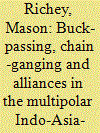

|
|
|
|
|
| Summary/Abstract |
Christensen’s and Snyder’s neorealist-based theory of buck-passing and chain-ganging uses offence-defence balance to predict state security policy choices under multipolarity. This approach is applicable to the US-led alliance system in the multipolar Indo-Asia-Pacific. Given regional Sino-US rivalry, hedging opportunities for US ‘hub-and-spoke’ allies will dissipate, increasing the likelihood of allies choosing to buck-pass or chain-gang in the face of conflict. With defence superior in the region, it is more likely that US allies will buck-pass rather than chain-gang. Beyond Indo-Asia-Pacific states, this has implications for global actors – such as the EU – seeking to raise their security profile in the region, as buck-passing behaviour gives greater time to adjust to potential conflict scenarios than chain-ganging.
|
|
|
|
|
|
|
|
|
|
|
|
|
|
|
|
| 3 |
ID:
165875
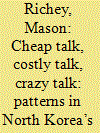

|
|
|
|
|
| Summary/Abstract |
This article examines the patterns in the Democratic People’s Republic of Korea’s (North Korea’s) use of hostile rhetoric in its internationally-directed messaging. The article first places North Korea’s belligerent rhetoric in the context of that country’s capacity to threaten the US and its Northeast Asian allies; indeed many analysts worry that Pyongyang’s rhetoric represents a conflict escalation risk or even a casus belli. Following this, the article discusses the common explanations – irrationality/incompetence, lack of audience costs, inter alia – for why the North Korean regime employs such hostile rhetoric, and finds these explanations wrong or misleading. The main analysis section describes the results of a study of 10 years of English-language propaganda published by the KCNA (North Korea’s state news agency). A multiple regression model is used to test the relationship between North Korea’s hostile rhetoric and a set of independent variables. The statistical tests indicate a mixed correlation of North Korean rhetoric to the independent variables. One major finding is that there is no correlation between hostile North Korean rhetoric and the country’s kinetic provocations. The conclusion discusses the role that North Korea’s rhetoric plays within the country’s larger adversarial relationship to the US, South Korea, and Japan.
|
|
|
|
|
|
|
|
|
|
|
|
|
|
|
|
| 4 |
ID:
157603
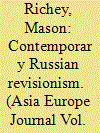

|
|
|
|
|
| Summary/Abstract |
In this policy brief, after an account of the historical-political context of Russia’s recent aggressive actions, I examine the objectives, strategy, and tactics of Russia’s information warfare, particularly as concerns eastern Europe and Syria, although also against selected western European states and the USA. Of special interest is the notion that Russia’s disinformation is potent because it does not necessarily establish falsehoods as true, but rather pollutes political discourse such that news information consumers are led to doubt the very concepts of truth and objective political facts. I conclude by (a) discussing the impact this strategy has had—and will continue to have—on Europe’s domestic politics, as well as on the global liberal order, and then (b) broaching policy ideas for countering Russian disinformation.
|
|
|
|
|
|
|
|
|
|
|
|
|
|
|
|
| 5 |
ID:
112751
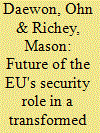

|
|
|
|
|
| Publication |
2012.
|
| Summary/Abstract |
A fundamentally new security landscape is unfolding in East Asia due to the
changing power structure among the great powers, particularly owing to the fast
rise of China and the relative decline of the United States. This paper analyzes the
dynamics of power transition in East Asia and assesses the possibility of the EU
playing a meaningful role in the strengthening of security governance in the
region. It begins by arguing that although the East Asian region is entering a
transformation stage it will not likely lead to a major collision between the United
States and China. This means the EU will have opportunities to become involved
in East Asian security affairs, provided it further strengthens its multi-faceted,
comprehensive engagement policies vis-à-vis the region. We focus particularly
on the EU's ability to promote the positive aspects of East Asian regionalism via
deepened and expanded cooperative measures such as bilateral and multilateral
framework agreements with regional countries and organizations. In addition to
offering a reliable model for regional security governance, the EU will be able to
contribute to regional security by cooperating with the United States and other
East Asian countries and organizations in selected security issues, such as sea-lane
protection, counter-terrorism, non-proliferation of Weapons of Mass Destruction
(WMD), humanitarian operations, etc. Internally, we show that after the Treaty of
Lisbon the EU is approaching incrementally a position wherein it can make
greater CFSP/CSDP engagements-particularly those associated with peacekeeping/
peacemaking and humanitarian operations-in the wider world including East
Asia.
|
|
|
|
|
|
|
|
|
|
|
|
|
|
|
|
| 6 |
ID:
124613
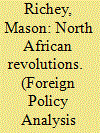

|
|
|
|
|
| Publication |
2013.
|
| Summary/Abstract |
In this paper, I discuss EU and member state externalization of the handling of non-EU, irregular migration flows. Following a historical and theoretical Introduction, I address in section "European Reactions to the Migration Flows Following the Arab Spring" the migration consequences of the 2011 North Africa revolutions, focusing particularly on how they provoked an EU migration policy crisis. Then, I show in section "Migration Policy Development in the EU: Fortress Europe or Strategic Incoherence?" how this was an outcome of the ineffectualness and strategic incoherence of EU immigration policy. This is ironic because the EU is criticized-incorrectly, I claim-for having developed a well-oiled non-entrée regime that skirts human/immigrant rights obligations by externalizing interdiction, detention, and processing of irregular migrants to countries with lower detention standards and higher human rights abuse rates. In section "The Member States' Role in the Externalization of European Migration Policy", I demonstrate that when such externalization policies are enacted, they are less due to EU action and more a function of member state decisions. I show that EU periphery member states are responsible for the most problematic policies partially because constraints on EU-level policy making incentivize these member states to erect "Fortress Europe" through their own devices.
|
|
|
|
|
|
|
|
|
|
|
|
|
|
|
|
| 7 |
ID:
190033


|
|
|
|
|
| Summary/Abstract |
North Korea’s 2022 was largely a continuation of the political/economic, military, and diplomatic dynamic from 2020–21, but with different accents. Given the path dependence of military/nuclear modernization, domestic political/economic structural constraints, and the geostrategic situation in East Asia, 2023 in North Korea is likely to continue these same trends. Two big questions loom. (1) How will North Korea open up from COVID border closures, which might make better economic performance possible? (2) How will North Korea manage inter-Korean relations, and is the Korean Peninsula headed for a situation in which the security dilemma of a long-term deterrence relationship between the US–South Korea alliance and North Korea spills over into kinetic conflict?
|
|
|
|
|
|
|
|
|
|
|
|
|
|
|
|
| 8 |
ID:
150579


|
|
|
|
|
| Summary/Abstract |
ASIAN MEGACITIES HAVE INFAMOUSLY HIGH AIR POLLUTION, USUALLY THE RESULT
of privileging economic growth over the environment. It is thus noteworthy
when conurbations in Asia address both. The city of Seoul, Korea is a laudable
example
|
|
|
|
|
|
|
|
|
|
|
|
|
|
|
|
|
|
|
|
|